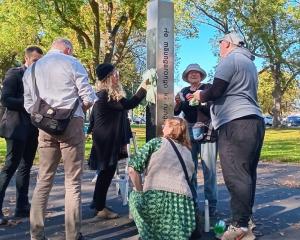Dunedin Budget Advisory Service executive officer Shirley Woodrow said three times more beneficiaries were being referred by Work and Income to the budgeting service in Dunedin since the Future Focus legislation was signed into law in September 2010.
The Ministry of Social Development website said the legislation was designed to give repeat hardship payment applicants greater support in budgeting.
Mrs Woodrow said another paid worker was taken on to cope with demand from the legislation.
They were coping but resources were stretched thin because half of the appointments booked by beneficiaries were not attended.
Consequently, some beneficiaries wanting hardship assistance payments for food had to wait to get the budgeting advice before they could get the emergency payment, Mrs Woodrow said.
"If they've got no food, which quite often is why they go to Work and Income, then they have to wait to be seen and it defeats the purpose, because they can't get the help when they need it."
There was no excuse for a beneficiary to miss a scheduled appointment because the service made house calls, she said.
Work and Income could stop the payment of a hardship assistance for non-attendance but this did not happen often because of the effect on the family, Mrs Woodrow said.
Many beneficiaries made appointments but only wanted the piece of paper to prove attendance and many did not seem to take on board any of the budgeting advice.
However, some beneficiaries were doing everything right with their money but their benefit was not big enough to cover basic living costs.
There was no easy answer to the problem, she said.
Social Development Ministry southern regional commissioner John Allen said the ministry provided $9.5 million of funding in 2011-12 to more than 150 community organisations for budgeting services.
"This compares to $4.3 million of funding for budgeting services in 2007-08."
If a beneficiary received three special needs grants, advance payments of benefit or recoverable assistance payments in the past year, they must take reasonable steps to complete a budgeting activity, he said.
New Zealand Federation of Family Budgeting Services CEO Raewyn Fox said more people were seeking budgeting advice.
About 55,000 people had asked for budgeting advice this year, 23,500 more than two years ago.
There were three reasons for the increase, she said: Work and Income implementing the legislation; more people being made redundant or having their working hours reduced and not having enough savings to fall back on; and people asking for budgeting advice earlier.
People seeking advice two years ago had an average of $32,000 debt but clients seeking advice in 2012 had $20,000 debt, she said.
The increase in the number of people seeking advice had stretched resources for budgeting services, she said.
"We have more budget advisers, working more hours, across more budgeting services and still our budgeting services are swamped," she said.
"Budgeting services are feeling a similar squeeze to many of their clients."












